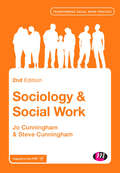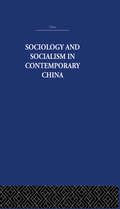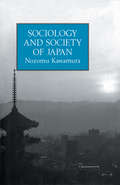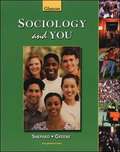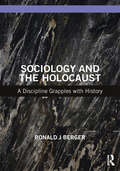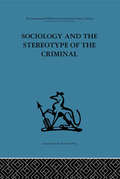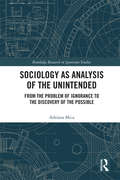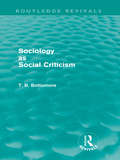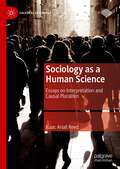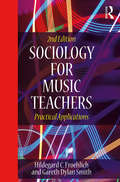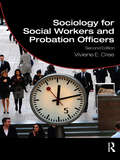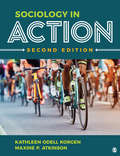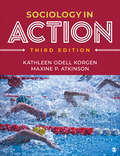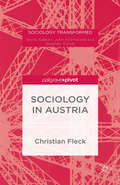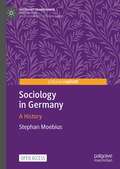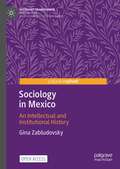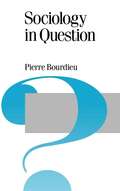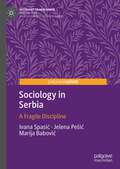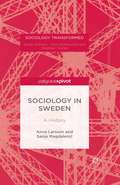- Table View
- List View
Sociology and Social Work (Transforming Social Work Practice Series)
by Jo Cunningham Dr Steve CunninghamSociological perspectives and their application to social work are an inherent part of the QAA benchmark statements in the social work degree. In addition, graduates must understand how sociological perspectives can be used to dissect societal and structural influences on human behaviour at individual, group and community levels. This fully-revised second edition includes a new chapter on social class and welfare and is mapped to the new Professional Capabilities Framework for Social Work.
Sociology and Socialism in Contemporary China
by Siu-lun WongFirst published in 1979. Sociology flourished in China during the 1930s and 1940s but with the establishment of the People's Republic of China, controversies arose over the place of sociology in the process of socialist construction. Siu-lun Wong analyses the reasons for this change in the fortune of sociological studies in China and examines it in relation to the country's contemporary political system.
Sociology and Society Of Japan
by Nozomu KawamuraFirst published in 1994. Many Japanese sociologists tend to regard the existence of local communal relationships in Japan as pre-modern, traditional and irrational. But the present author thinks of these as the primary charge of the move to post-modern societies in Japan. With field research caried out in Shimoda city in Shizuoka prefecture, Yokoshiba town in Chiba prefecture, Okaya city, Suwa city and Shimosuwa town in Nagano prefecture.
Sociology and You
by Jon M. Shepard Robert W. GreeneA sociology program written exclusively for high school students, Sociology and You is written by successful authors with extensive experience in the field of sociology. Meet American Sociological Association standards for the teaching of sociology in high school with this comprehensive program.
Sociology and the Holocaust: A Discipline Grapples with History
by Ronald J BergerFor some time the conventional wisdom in the interdisciplinary field of Holocaust studies is that sociologists have neglected this subject matter, but this is not really the case. In fact, there has been substantial sociological work on the Holocaust, although this scholarship has often been ignored or neglected including in the discipline of sociology itself. Sociology and the Holocaust brings this scholarly tradition to light, and in doing so offers a comprehensive synthesis of the vast historical and social science literature on the before, during, and after of the Holocaust—a tour d’horizon from an explicitly sociological perspective. As such, the aim of the book is not simply to describe the chronology of events that culminated in the deaths of 6 million Jews but to draw upon sociology’s “theoretical toolkit” to understand these events and the ongoing legacy of the Holocaust sociologically.
Sociology and the Holocaust: A Discipline Grapples with History
by Ronald J BergerFor some time the conventional wisdom in the interdisciplinary field of Holocaust studies is that sociologists have neglected this subject matter, but this is not really the case. In fact, there has been substantial sociological work on the Holocaust, although this scholarship has often been ignored or neglected including in the discipline of sociology itself. Sociology and the Holocaust brings this scholarly tradition to light, and in doing so offers a comprehensive synthesis of the vast historical and social science literature on the before, during, and after of the Holocaust—a tour d’horizon from an explicitly sociological perspective. As such, the aim of the book is not simply to describe the chronology of events that culminated in the deaths of 6 million Jews but to draw upon sociology’s “theoretical toolkit” to understand these events and the ongoing legacy of the Holocaust sociologically.
Sociology and the Stereotype of the Criminal
by Dennis ChapmanTavistock Press was established as a co-operative venture between the Tavistock Institute and Routledge & Kegan Paul (RKP) in the 1950s to produce a series of major contributions across the social sciences. This volume is part of a 2001 reissue of a selection of those important works which have since gone out of print, or are difficult to locate. Published by Routledge, 112 volumes in total are being brought together under the name The International Behavioural and Social Sciences Library: Classics from the Tavistock Press. Reproduced here in facsimile, this volume was originally published in 1968 and is available individually. The collection is also available in a number of themed mini-sets of between 5 and 13 volumes, or as a complete collection.
Sociology as Analysis of the Unintended: From the Problem of Ignorance to the Discovery of the Possible (Routledge Research in Ignorance Studies)
by Adriana MicaSociology of unintended consequences is commonly depicted as a framework for understanding the outcomes that run counter to the initial intentions of social actors because of factors such as ignorance, error and complexity. This conventional approach, however, is now undergoing change under the influence of more encompassing shifts in framing in social sciences. Indeed, in the last few years, the study of the unintended has evidently moved from the question "What are the sources of the unintended?" to the inquiry "What is it that makes the unintended possible?" or "What risks, but also opportunities, do the unintended entail?" Explaining this puzzle in relation to the internal dynamics of sociology of unintended consequences, Adriana Mica makes an erudite journey in relation to its three main analytical frameworks, their semantic shifts, setbacks and theoretical revivals. Certainly, through the examination of the use of protective headgear in boxing, this volume renders explicitly the possibilistic turn not only in the specific research of the unintended, but in sociology more generally. Presenting the contributions of leading sociology theorists in a new light, Sociology as Analysis of the Unintended will appeal to graduate students and researchers interested in fields such as theoretical sociology, sociology of substantive issues and sociology of sport.
Sociology as Social Criticism (Routledge Revivals)
by Tom B. BottomoreFirst published in 1975, this collection of essays embodies a conception of sociological thought as a critical analysis of social theories and doctrines, of social institutions and political regimes, of recent social movements. They deal, in particular, with some conservative versions of sociology and with attempts to develop more radical theories; they extend the author's previous writings on classes, elites and politics; and they analyse some of the problems of socialism in the late twentieth century. There is a close unity of theme througout the book in its critical attempt to formulate new intellectual bases for future radical and egalitarian politics. It is written with that quiet wisdom and impressive command of sources which readers have come to associate with Professor Bottomore's work.
Sociology as a Human Science: Essays on Interpretation and Causal Pluralism (Cultural Sociology)
by Isaac Ariail ReedSociology as a Human Science is a set of foundational, wide-ranging and updated essays from Isaac Ariail Reed. Gathered together for the first time with a new introduction, they articulate a distinct perspective on concept and method in social science. Reed writes about realism and positivism, postmodernism and empiricism, mechanisms and causality, and power and history, developing thereby an understanding of the key debates out of which 21st-century sociology has developed. Carefully considering all manner of arguments in metatheory and epistemology and moving towards a program of interpretive explanation focused on culture and power, Reed places sociology at the center of debates about knowledge production across the humanities and social sciences. His reconstructive approach, positioned “after the posts” (poststructuralism, postmodernism, and postcolonialism) provides a way for interpretive sociology to provide analytically sound, theoretically extensive, and empirically rich understandings of social life.
Sociology as a Population Science
by John H. GoldthorpeJohn Goldthorpe is one of Britain's most eminent sociologists and a strong advocate of quantitative sociology. In this concise and accessible book, he provides a new rationale for recent developments in sociology which focus on establishing and explaining probabilistic regularities in human populations. Through these developments, Goldthorpe shows how sociology has become more securely placed within the 'probabilistic revolution' that has occurred over the last century in the natural and social sciences alike. The central arguments of the book are illustrated with examples from different areas of sociology, ranging from social stratification and the sociology of the family to the sociology of revolutions. He concludes by considering the implications of these arguments for the proper boundaries of sociology, for its relations with other disciplines, and for its public role.
Sociology class 8 - Karnataka board: ಸಮಾಜಶಾಸ್ತ್ರ 8 ನೇ ತರಗತಿ - ಕರ್ನಾಟಕ ಮಂಡಳಿ
by Karnataka Patyapusthaka SanghaSociology text book for 8th standard kannada medium, Karnataka State
Sociology for Music Teachers: Practical Applications
by Gareth Dylan Smith Hildegard C. FroehlichFor upper level undergraduate and introductory graduate and doctoral courses in music education. Outlining the basic aspects, constructs and concepts relevant to understanding music teaching and learning from a sociological perspective, this volume introduces students to the discipline as a tool in understanding their own work. The text shows how certain academics in music, sociology and education have thought about the relationship of music to education, schooling and society and examines the consequences of such thinking for making instructional choices in teaching methods and repertoire selection. School music teaching is imbedded in two major societal traditions: (1) the tradition of music making, listening, and responding; and (2) the tradition of education as a societal mandate. The first tradition holds firmly to music artistry and musicological scholarship, the latter of which includes music sociology. The second tradition, that of education as a field of study, relies mostly on pedagogical principles rooted equally in psychology and sociology. Hildegard Froehlich bases the book upon the premise that a music teacher's work is equally shaped by both traditions. The more music teachers become aware of how societal structures shape their own lives as well as the lives of their students, colleagues, and superiors; the more "reality-based" their teaching will become. Society is a composite of communities in which different social classes, groups, and reference groups co-exist-to varying degrees of compatibility due to real or perceived differences in norms and values as well as hierarchies of power. Informed or intuitive choices made by an individual indicate allegiances to particular groups, how those groups are structured hierarchically; and where and how each individual fits into those hierarchies. This is true for the music world as it is true for the world of education.
Sociology for Social Work: An Introduction
by Alastair Gibson Chris YuillThis excellent textbook introduces the social work student to the field of sociology, illustrating how sociology is connected to and fundamental to effective social work practice. Each chapter applies theory to practice and is uniquely co-written by a sociologist, social worker and service user. A wide range of topics and subjects relevant to social work are covered, including: -Gender -Class -Ethnicity and race -Ageing -Health -Intimacies -Social exclusion -Crime and deviance -Communities -Disability The book comes with access to an exciting companion website offering the reader downloads, web links, powerpoint slides and case studies. Every chapter of the book further includes further case studies, along with lots of clear definitions of terms, and reflection points, making this book the essential introductory text for all social work students.
Sociology for Social Workers and Probation Officers
by Viviene E. CreeHow does a social work student make the connection between sociological knowledge and day-to-day social work? Sociology for Social Workers and Probation Officers provides an introduction to sociological ideas and research and places them firmly into the context of actual social work practice. It encourages readers to develop critical awareness and reach their own judgements about the usefulness and implications of holding certain conceptual positions and shows how social work can be better informed and improved by doing so. Fully revised and updated throughout, this second edition examines sociology in relation to key areas of social work and probation practice, and includes one new chapter. Areas covered are: Family Childhood Youth Community Care and Caring Health and Illness Crime. Essential reading for all social work and probation studies students, this text looks beyond individual and psychological explanations and solutions to develop a sociological knowledge base for social work practice.
Sociology in Action
by Kathleen Odell Korgen Maxine P. AtkinsonWake up your introductory sociology classes! Sociology in Action helps your students learn sociology by doing sociology. Sociology in Action by Kathleen Odell Korgen and Maxine P. Atkinson will inspire your students to do sociology through real-world activities designed to increase learning, retention, and engagement with course material. Packed with new activities and thought-provoking questions to help explain key concepts, the Second Edition of this innovative bestselling text immerses students in an active learning experience that emphasizes hands-on work, application, and learning by example. Each chapter has been updated to reflect recent societal changes including: the causes for and ramifications of the 2016 election; the latest issues facing the LGBT community, people of color, immigrants and refugees, and the shrinking middle class; and student loan debt. The comprehensive Activity Guide that accompanies the text provides everything you need to assign, carry out, and assess the activities that will best engage your students, fit the format of your course, and meet your course goals. Also available as a digital option (courseware). Contact your rep to learn more about Sociology in Action, Second Edition - Vantage Digital Option.
Sociology in Action
by Kathleen Odell Korgen Maxine P. AtkinsonWake up your introductory sociology classes! Sociology in Action helps your students learn sociology by doing sociology. Sociology in Action by Kathleen Odell Korgen and Maxine P. Atkinson will inspire your students to do sociology through real-world activities designed to increase learning, retention, and engagement with course material. Packed with new activities and thought-provoking questions to help explain key concepts, the Second Edition of this innovative bestselling text immerses students in an active learning experience that emphasizes hands-on work, application, and learning by example. Each chapter has been updated to reflect recent societal changes including: the causes for and ramifications of the 2016 election; the latest issues facing the LGBT community, people of color, immigrants and refugees, and the shrinking middle class; and student loan debt. The comprehensive Activity Guide that accompanies the text provides everything you need to assign, carry out, and assess the activities that will best engage your students, fit the format of your course, and meet your course goals. Also available as a digital option (courseware). Contact your rep to learn more about Sociology in Action, Second Edition - Vantage Digital Option.
Sociology in Action
by Kathleen Odell Korgen Maxine P. AtkinsonSociology in Action, Third Edition is an introductory text that encourages doing sociology through real-world activities that emphasize hands-on work, application, and learning by example. Each chapter is written by a specialist in that subject who also shares a passion for active learning. Edited by Kathleen Odell Korgen and Maxine P. Atkinson, this text explains sociology′s key concepts and theories, and pairs that foundational coverage with a series of carefully developed, assignable learning activities that prompt students to think and reflect, observe, analyze, investigate, and apply what they are learning. This title is accompanied by a complete teaching and learning package. Contact your SAGE representative to request a demo. Learning Platform / Courseware SAGE Vantage is an intuitive learning platform that integrates quality SAGE textbook content with assignable multimedia activities and auto-graded assessments to drive student engagement and ensure accountability. Unparalleled in its ease of use and built for dynamic teaching and learning, Vantage offers customizable LMS integration and best-in-class support. It’s a learning platform you, and your students, will actually love. Learn more. Assignable Video with Assessment Assignable video (available in SAGE Vantage) is tied to learning objectives and curated exclusively for this text to bring concepts to life. Watch a sample video now. LMS Cartridge: Import this title’s instructor resources into your school’s learning management system (LMS) and save time. Don’t use an LMS? You can still access all of the same online resources for this title via the password-protected Instructor Resource Site. Learn more.
Sociology in Action
by Kathleen Odell Korgen Maxine P. AtkinsonSociology in Action, Third Edition is an introductory text that encourages doing sociology through real-world activities that emphasize hands-on work, application, and learning by example. Each chapter is written by a specialist in that subject who also shares a passion for active learning. Edited by Kathleen Odell Korgen and Maxine P. Atkinson, this text explains sociology′s key concepts and theories, and pairs that foundational coverage with a series of carefully developed, assignable learning activities that prompt students to think and reflect, observe, analyze, investigate, and apply what they are learning. This title is accompanied by a complete teaching and learning package. Contact your SAGE representative to request a demo. Learning Platform / Courseware SAGE Vantage is an intuitive learning platform that integrates quality SAGE textbook content with assignable multimedia activities and auto-graded assessments to drive student engagement and ensure accountability. Unparalleled in its ease of use and built for dynamic teaching and learning, Vantage offers customizable LMS integration and best-in-class support. It’s a learning platform you, and your students, will actually love. Learn more. Assignable Video with Assessment Assignable video (available in SAGE Vantage) is tied to learning objectives and curated exclusively for this text to bring concepts to life. Watch a sample video now. LMS Cartridge: Import this title’s instructor resources into your school’s learning management system (LMS) and save time. Don’t use an LMS? You can still access all of the same online resources for this title via the password-protected Instructor Resource Site. Learn more.
Sociology in Austria since 1945 (Sociology Transformed)
by C. FleckSociology in Austria has been frequently affected by political developments in the country. This first history of sociology in Austria examines the impact of the break-up of the Habsburg Empire and of two consecutive dictatorships, which destroyed academic freedom by means of forced migration and imprisonment. Even after 1945 the re-established Second Republic did not dismiss professors promoted during the Nazi period, and failed to invite exiled academics to return home. The author argues that the result has been a continuation of favouritism and conformism, with compliance to political regimes sanctioned at the expense of meritocracy and that in the light of this chequered past we should celebrate instances of de-institutionalization.
Sociology in Germany: A History (Sociology Transformed)
by Stephan MoebiusThis open access book traces the development of sociology in Germany from the late 19th century to the present day, providing a concise overview of the main actors, institutional processes, theories, methods, topics and controversies. Throughout the book, the author relates the discipline’s history to its historical, economic, political and cultural contexts. The book begins with sociology in the German Reich, the Weimar Republic, National Socialism and exile, before exploring sociology after 1945 as a ‘key discipline’ of the young Federal Republic of Germany, and reconstructing the periods from 1945 to 1968 and from 1968 to 1990. The final chapters are devoted to sociology in the German Democratic Republic and the period from 1990 to the present day. This work will appeal to students and scholars of sociology, and to a general readership interested in the history of Germany.
Sociology in Mexico: An Intellectual and Institutional History (Sociology Transformed)
by Gina ZabludovskyThis open access book presents a condensed history of Sociology in Mexico from its origins, through to the middle of the 19th century and up to the present day. The book analyses the interaction between sociology and the main economic, political and social change in the country, including the 1910 Mexican Revolution, the main social movements, the role of the intellectual exiles from Spain and Latin America, and the participation of women, who have often remained invisible in the history of sociology. The book explores how sociological discourse played a fundamental role in the separation of secular and public education and the search for a ‘national project’ from 1868 onwards, despite the lack of an institute of social research until 1930; how sociology became an autonomous social science, led by a few intellectuals and public figures, as it became institutionalized in universities, and the effect this had on the development of the discipline; the influence of Marxism during the 1970s; and the progression from a process of specialization after the fall of the Berlin Wall to a new trend of working in collective projects with an increasing interdisciplinary perspective in the first decades of the 21st century.
Sociology in Question
by Pierre BourdieuThe works of Pierre Bourdieu occupy a central place in the current development of world sociology. This volume offers an accessible but challenging introduction to Bourdieu′s ideas. In a series of discussions, lectures and interviews, the range of Bourdieu′s ideas is laid out and its relation to other disciplines and other sociological schools is explored. The issues developed include the sociology of culture, leisure and taste; the intrinsic reflexivity of social science; and the role of language in society and social sciences.
Sociology in Serbia: A Fragile Discipline (Sociology Transformed)
by Ivana Spasić Jelena Pešić Marija BabovićThis book represents the first comprehensive century-long history of the disciplinary development of sociology in Serbia in English. It provides an overview of the constitution of sociology as an academic discipline during the interwar period, its reinstitutionalization after World War II in entirely new social circumstances marked by establishment of self-management socialism in Yugoslavia, and finally its development during the turbulent postsocialist period. Divided into five chapters, the focus of the book is on the challenges that sociology has faced in order to maintain its institutional position, gain adequate social recognition, and preserve its professional autonomy. Relying on Bourdieu's concept of the academic field and Burawoy's typology of Professional, Critical, Public and Policy sociology, the book seeks to answer the question of how the sociological academic field in Serbia has been constituted, structured and restructured, and in which of these roles sociology has dominantly appeared in different phases of its evolution.
Sociology in Sweden: A History (Sociology Transformed)
by Anna Larsson Sanja Magdaleni?This book offers a brief but comprehensive overview of the history of sociology in Sweden from the prewar period to the present day. It focuses in particular on scientific boundaries, gender and the relationship between sociology and the Swedish welfare state.
